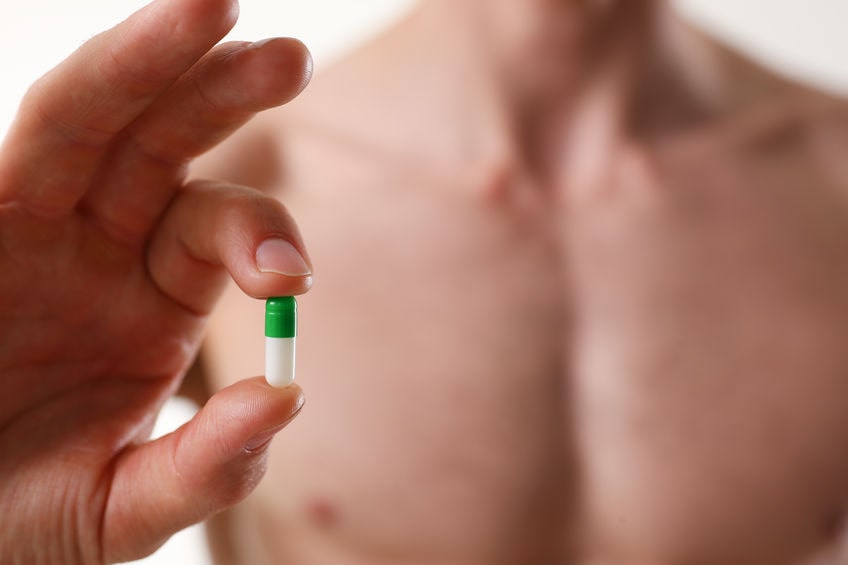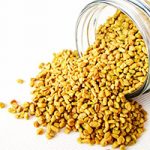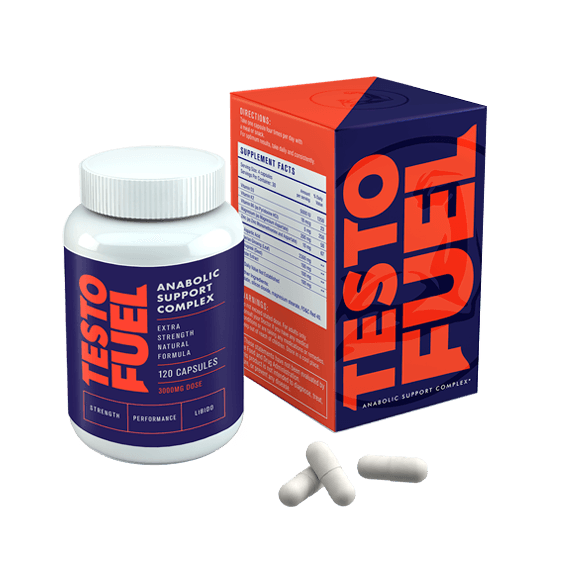
Testosterone is an important sex hormone, for both men and women. Unfortunately, all men experience a natural decline in the hormone as they age. For this reason, many are turning to testosterone boosters. But what are t boosters, and do they even work?
In this article, we uncover why testosterone is so important for human health, what testosterone boosters are and the best natural ingredients for boosting your T.
– View our best rated testosterone boosters –
What is testosterone?
Testosterone is the main sex hormone that plays a huge role in men’s health and wellbeing. It’s primarily important for sexual and reproductive development, however, it’s also essential for other elements of your health too.
In men, optimal T levels are vital from a young age because it can impact the male body in multiple ways. In the male body, testosterone helps with[1]:
- The development of the penis & testes
- Appearance of facial/pubic hair at puberty
- Bone growth & strength
- Sex drive
- Muscle size & strength
- Fertility

In women, testosterone contributes to bone strength, ovarian function, sexual behavior and energy levels[2].
Healthy males who have gone through puberty are considered to have 20 times the levels of testosterone compared to women.
Testosterone levels are at their peak in teen years and thrive right through the 20s, before sloping at age 30. As men age, testosterone levels drop by about one to two percent per year[3]. Normal testosterone levels for men range anywhere between 300-1000 ng.dL[4].
Once they fall below the 300 ng.dL baseline, however, they’re considered low. Testosterone deficiency can be responsible for a whole host of impediments.
Not sure what the signs of low testosterone? Symptoms usually include[5]:
- Low libido
- Impaired sexual function/ED
- Infertility
- Muscle loss
- Irritability
- Brain fog
- Frailty/weakness
- Low mood
- Depression
- Anxiety
If you’ve gone into panic mode, there’s no need to stress too much. While testosterone is important, and yes, levels do drop, there are things you can do to keep your T at optimum heights.
Lifestyle, of course, is one important factor – if you’re fit and healthy, you’re likely doing a good job at keeping your T levels in check.
If you need another option, testosterone boosters might help.
What are testosterone boosters?
Testosterone boosters are dietary supplements that are used to raise the level of testosterone in your body.
They are generally plant-based, containing ingredients that all encourage your body to make more T. We’ll go into more detail about their ingredients a little later on.
More brands are introducing testosterone boosting supplements to the market – and more people are buying them. It’s no surprise since the body of evidence backing the positive effect of T boosting ingredients is on the rise.
But do these T boosters work, and should you be taking them?
– View our best rated testosterone boosters –
Should I take a t-booster?
Deciding to take a testosterone booster comes down to your own health and wellbeing. If you’re genuinely concerned about low testosterone, you should speak to your doctor who will be able to guide you on how to tackle it.
Generally speaking, T boosters are naturally developed and offer a safe and gentle way to approach lowered T levels. If you’re already taking medications, however, T boosters are generally not recommended. This is because the ingredients may interact and cause unwanted side effects.
Testosterone is perhaps the most important hormone every man has. Virility, better body composition, and even mental health are all fundamentally connected to it.
When your testosterone is under threat, your wellbeing is too – so keeping it in check with a T booster might not be a bad idea.
Also, check out our guide on how to increase your t levels naturally and whether or not working out actually increases your t levels.

Best testosterone-boosting ingredients
We’ve delved into the world of testosterone boosting ingredients so that you know exactly what you should look for in a testosterone booster supplement.
Here are the best ingredients in T boosters.
1. D-Aspartic acid (DAA)
This non-essential amino acid has many functions in the body, an important one being making and releasing hormones in the body. DAA is said to help with the production of luteinizing hormone, a primary hormone that is connected to the production of testosterone[6].
Countless studies have evidenced that increasing D-AA in your body can boost testosterone and fertility in testosterone-deficient men[7]. In the same study, among the 30 partners of the patients treated with D-aspartate, 10 became pregnant.
2. Tribulus Terrestris
Also known as Bindii, Tribulus Terrestris is an herb from Ayurveda that is widely recommended for male health. The herb has traditionally been used in Ayurveda medicine[8] and is known to enhance libido, keep the urinary tract healthy and even increase T levels[9].
It also appears to have a positive influence on the libido. In one 90-day study on men with erectile dysfunction, Tribulus terrestris increased T levels by 16 per cent[10]. This same effect can also be seen in women – with one study revealing Tribulus terrestris was effective in improving women’s sex drive.
3. Fenugreek

This powerful medicinal plant native to India and North Africa is commonly used in supplements and cooking. It generally finds itself in T boosters because of its claimed ability to improve testosterone production.
Fenugreek contains saponin, an active ingredient that may be effective at increasing testosterone levels. One 8-week study revealed that 49 athletic men who took 500 mg of fenugreek daily, slightly increased T levels as well as stronger compared to a placebo group[11].
4. Dehydroepiandrosterone (DHEA)
This hormone is naturally produced by the adrenal glands where some is converted into major male and female sex hormones[12]. Its production peaks in your mid-20s before starting to gradually decline, the older you get.
Taking it as a supplement should increase DHEA levels in your body and therefore raise T levels.
In a study on middle-aged and young men, DHEA supplementation was shown to elevate free testosterone levels following high-intensity interval training[13].
DHEA appears to be an ingredient also useful for women. In one study, it increased the success of in vitro fertilization (IVF) in 25 women dealing with fertility problems[14]. Numerous studies also evidence that DHEA increases libido and sexual function in both men and women[15][16].
5. Vitamin D
Known for being the sunshine vitamin, vitamin D is found in a small number of foods. However, it’s mainly developed by the body via direct sunlight on the skin. It’s not very well known, but vitamin D may actually help regulate T levels[17].
This vitamin is known for keeping bones, teeth and muscles healthy; however, research also suggests that not getting enough vitamin D can cause T levels to drop[18].
Many people don’t get enough vitamin D, especially if they have very little or no sunshine exposure. In fact, experts estimate that around 50% of the planet’s population is vitamin D deficient[19]. That’s why it’s recommended that you supplement with the vitamin in the winter months.
One study showed that men who supplement with vitamin D for 365 days can raise their testosterone production significantly[20].
6. Zinc

Zinc is an essential dietary mineral important for overall health and wellbeing. It is available in a variety of forms, all which influence your health in different ways.
These include:
- Gluconate – the most common form of Zinc usually added to cold medicines such as nasal sprays.
- Picolinate – considered the best form of zinc because it may be better absorbed by your body .
- Acetate – works as an astringent and is often added to lozenges to reduce symptoms of a sore throat.
Zinc is known to have a close connection to T levels because of its role in testosterone production, however, it may only work if you have a deficiency in the mineral.
In one study on marginally zinc-deficient normal elderly men, zinc supplementation increased serum testosterone levels over a period of six months[21]. In another study on elite-level athletes, zinc supplementation was shown to inhibit a testosterone drop and support recovery when athletes exercised to total exhaustion[22].
7. Ashwagandha
This vital herb belongs to the adaptogen family, meaning it can help your body deal with stress and anxiety[23]. It has a proven ability to reduce stress, improve concentration, boost energy levels[24] as well as increase testosterone levels[25].
Ashwagandha can impact your hormones so it only makes sense that it affects testosterone levels too. Experts suggest it offers testosterone boosting ability by blocking the stress hormone, cortisol[26].
When elevated cortisol levels become chronic, it’s a disaster for hormone equilibrium. Reducing stress in your body is vital for giving your body a chance to balance its hormones. Other studies suggest that ashwagandha might even boost fertility[27], muscle building and fat loss too[28][29].
8. Ginger
Used for its culinary and medicinal properties, ginger contains a range of compounds and metabolites which may contribute to health and healing. One of its many health claims is its supposed ability to decrease inflammation, swelling and pain[30].
However, ginger may also be useful for upping that T. According to the results of a 2012 study, a daily ginger supplement increased testosterone levels by 17.7% over three-months in men with fertility problems.
Scientists also state that ginger may improve sperm health – one study found that it triggered an approximate 16% increase in sperm count when sperm health was measured[31].
FAQs
Do testosterone boosters work?

A good testosterone booster should deliver in a few key areas and look to provide some balance to this important hormone.
Most are created using a multitude of well-evidenced ingredients – like the ones we mentioned above. Testosterone boosters shouldn’t be confused with hormone replacement.
They don’t do such a thing, but rather provoke your body into producing more T. A high-quality supplement should use ingredients that have substantial evidence behind them.
If the testosterone booster is safe, natural and well-researched, it should be effective. You can generally tell how effective a T booster is by the ingredients it contains – so if it features any of the ingredients we mentioned earlier, you’re onto a winner.
Are testosterone boosters safe?
Most testosterone boosters are naturally formed and contain well-researched ingredients. If the testosterone booster is free of proprietary blends and contains no synthetic ingredients, we would say it is a safe formula.
Testosterone boosters aren’t designed for hormone replacement, they supply your body with Testo-benefiting nutrients and encourage your levels to thrive. Because of this, most T boosters are safe.
Are testosterone boosters steroid?
Testosterone boosters are not steroid. Steroids (AKA anabolic-androgenic steroids) are generally synthetic, man-made versions of testosterone that you take or inject.
They are only meant to be prescribed for by a doctor, made to treat conditions like hypogonadism (otherwise known as low testosterone). However, athletes have been known to use anabolic-androgenic steroids to gain a competitive edge.
This is why they are banned by most sporting federations.
Can women use a testosterone booster?
Many women use T-boosters to improve their sex drive or treat menopause symptoms. T-boosters (as we’ve shown) can be effective for this. In women, a testosterone booster should help with balanced hormone levels.
This function is important, especially around the menstrual cycle, as hormonal fluctuations can make women more prone to stress. By harmonizing testosterone and estrogen, T-boosters may alleviate some menstrual symptoms.
If you’re thinking about taking a testosterone booster, have your doctor check it first.
How long does it take for testosterone boosters to work?
The answer can vary depending on the testosterone boosting supplement you are taking as well as the levels of testosterone you already have. Most men notice an obvious difference within four to six weeks.
Does a testosterone booster help sexually?

If you have a low sex drive or suffer from erectile dysfunction, a T booster might help. Countless studies have demonstrated their ability to targeting issues like this. However, if you can address other lifestyle factors too (like nutrition and exercise) that will help even better.
Takeaway
There you have it – testosterone is super important. As a naturally occurring hormone, it plays a part in every aspect of health. Especially men’s health. So, it makes sense that we should keep our T levels at optimum levels.
Think you have signs of low testosterone? Take the necessary steps to optimize them for complete wellbeing.
Sometimes, this might just take a change in your nutrition or lifestyle to make any sort of positive difference. However, T boosters also exist to help. A testosterone booster can encourage your body to get its T levels back to normal.
Whether they promote its production or help block counteractive hormones, taking a testosterone booster may not be a bad idea. However, you have to find the right supplement for your needs.
Boosting your testosterone levels may be assisted by a healthy change in your diet or by a supplement, however, they aren’t a complete cure for hypogonadism. A doctor will be able to confirm if you have dangerously low levels of testosterone and advise on the right therapy for you
– View our best rated testosterone boosters –
References
[1] https://www.health.harvard.edu/drugs-and-medications/testosterone–what-it-does-and-doesnt-do
[2] As source 1
[3] https://www.ncbi.nlm.nih.gov/pmc/articles/PMC4445839/
[4] https://www.health.harvard.edu/mens-health/a-new-look-at-testosterone-therapy
[5] https://www.ncbi.nlm.nih.gov/pmc/articles/PMC3255409/
[6] https://www.ncbi.nlm.nih.gov/pmc/articles/PMC2774316/
[7] https://file.scirp.org/pdf/ASM20120400001_62630923.pdf
[8] https://www.ncbi.nlm.nih.gov/pubmed/24600195
[9] https://www.ncbi.nlm.nih.gov/pubmed/26727646
[10] https://www.ncbi.nlm.nih.gov/pmc/articles/PMC3665088/
[11] https://www.ncbi.nlm.nih.gov/pmc/articles/PMC2978122/
[12] https://www.ncbi.nlm.nih.gov/pubmed/12899651
[13] https://www.ncbi.nlm.nih.gov/pubmed/23417481
[14] https://www.ncbi.nlm.nih.gov/pubmed/16997936
[15] https://www.ncbi.nlm.nih.gov/pubmed/16849414
[16] https://www.ncbi.nlm.nih.gov/pubmed/16849414
[17] https://www.ncbi.nlm.nih.gov/pubmed/21154195
[18] https://www.ncbi.nlm.nih.gov/pubmed/20050857
[19] https://www.ncbi.nlm.nih.gov/pmc/articles/PMC3356951/
[20] As source 17
[21] https://www.ncbi.nlm.nih.gov/pubmed/8875519
[22] https://europepmc.org/abstract/med/16648789
[23] https://www.ncbi.nlm.nih.gov/pubmed/23439798
[24] https://www.ncbi.nlm.nih.gov/pubmed/19633611
[25] https://www.ncbi.nlm.nih.gov/pubmed/26609282
[26] https://www.ncbi.nlm.nih.gov/pubmed/23439798
[27] https://www.ncbi.nlm.nih.gov/pubmed/19789214
[28] https://www.ncbi.nlm.nih.gov/pubmed/19501822
[29] https://www.ncbi.nlm.nih.gov/pubmed/21170205
[30] https://www.ncbi.nlm.nih.gov/books/NBK92775/
[31] As source 16



Leave a comment